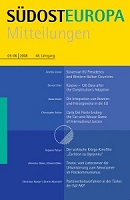Behind the Anatolian Revolution
Behind the Anatolian Revolution
Unveiling the Influence of Class on the Popularity of the Islamist Movement in Turkey
Author(s): Friedrich PüttmannSubject(s): Politics / Political Sciences
Published by: Südosteuropa Gesellschaft e.V.
Summary/Abstract: Unlike many European commentators who have been criticising the Turkish government overthe past year for deploying increasingly authoritarian policies, a large share of the Turkishpopulation has been celebrating the rule of the Islamic-conservative Justice and DevelopmentParty AKP and its powerful leader Recep Tayyip Erdoğan. The AKP’s election victory in 2002 hasdeeply changed the formerly staunchly secularist country of Atatürk. The far-reaching relevanceof the ‘Anatolian Revolution’ thus triggers the question what made the Islamist Movement sopopular at the time that it would so thoroughly succeed?Many have argued that the Turkish Islamist Movement has to be perceived as a ‘new socialmovement’ waging a cultural struggle for the greater recognition of traditional Islamic identitiesin the face of Kemalism’s Westernising modernization. This paper rather suggests that this isonly half of the truth. Using the concept of ‘framing’ to analyse the self-presentation of themovement, it will show that the popularity of the Islamist Movement in Turkey can only befully understood if the Islamist politics are also seen as a ‘classical social movement’ voicingthe economic class interests of both a deprived traditionalist proletariat and a rising Islamistbourgeoisie who engaged in a class conflict against the Kemalist elites and upper class.
Journal: Südosteuropa Mitteilungen
- Issue Year: 2016
- Issue No: 04
- Page Range: 30-43
- Page Count: 14
- Language: English
- Content File-PDF

